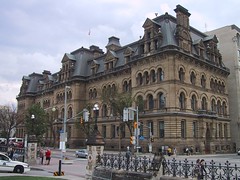Lag in releasing listeriosis notes breaks information law: experts
 Listeria monocytogenes - Image by AJC1 via Flickr
Listeria monocytogenes - Image by AJC1 via Flickr
Lag in releasing listeriosis notes breaks information law: experts
OTTAWA — The Harper government has delayed for months the release of notes on conference calls held at the height of last summer's deadly listeriosis outbreak - a lag some experts say breaks Ottawa's own information laws.
At issue is an Access to Information request by The Canadian Press to the Privy Council Office for "all transcripts and minutes" of the crucial exchanges last August and September.
 Privy Council Office (PCO) - Image by jascha via Flickr
Privy Council Office (PCO) - Image by jascha via Flickr
Officials were grappling at the time with a health crisis that sparked intense scrutiny of the national food safety system.
Twenty Canadians died after developing listeriosis, an outbreak that was traced to meat-processing equipment at a Maple Leaf Foods plant in Toronto.
Privy Council officials at first said they had records as requested, but needed four months "to consult other government institutions" about them.
Then Ann Wesch, the access to information director for PCO, wrote a letter dated Feb. 10 stating that in fact "the records retrieved do not fall under the scope of this request. Therefore we have no records relevant to your request."
The explanation for the flip-flop? Records retrieved were handwritten notes - not minutes or transcripts, said the PCO analyst questioned about the response.
This, despite the fact that the word transcribe is in part defined in the Canadian Oxford Dictionary as "make a copy of, esp. in writing . . . write out (shorthand, notes, etc.) . . . ."
Agriculture Canada, in an apparent contradiction of PCO's interpretation, released handwritten notes in answer to an identical request for related transcripts.
Retired Col. Michel Drapeau, a lawyer who co-wrote a book on federal information laws and teaches at the University of Ottawa, was astounded by the Privy Council response.
"It is silly," he said. "I would even say it's infantile to be making this sort of distinction.
"This goes against the spirit of the act and the letter of the act."
Drapeau stressed that the Harper government's own Federal Accountability Act added the onus of a "duty to assist" for institutions that fall under the Access to Information Act.
It requires that federal officials, "without regard to the identity of the person making a request . . . make every reasonable effort to assist the person in connection with the request, respond to the request accurately and completely and, subject to the regulations, provide timely access to the record in the format requested."
What's most disturbing, says Drapeau, is the tone that the Privy Council Office is setting as the public-service standard bearer providing advice and support to the prime minister and cabinet.
"The Privy Council has a duty by virtue of its mission in life to serve as a beacon, to serve as an example, to all public servants - because this is where all authority flows from. This is why the head of the Privy Council Office is also . . . the top public servant.
"And they're setting a bad example. Simple as that."






